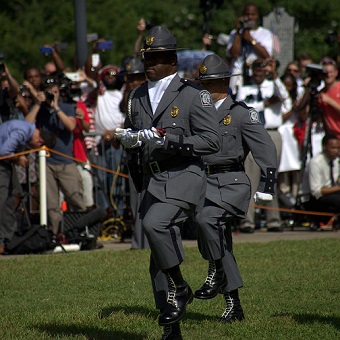THE THEOLOGICAL ENGINEER
Clanging Symbols
How should a Christian view the Confederate Flag?
By Jeff Laird

After the racially-motivated church shooting in Charleston, South Carolina, some have called for the banning of this flag as a symbol of racism. Others have defended it as an historical image, and not inherently representative of racial prejudice. Efforts to purge the symbol have run to the extreme, even attacking games which use it in correct historical contexts, or banning television shows where it appears on a character's car. Defenders have been equally passionate. How, then, should Christians handle the Confederate flag? Obviously, the Bible has nothing specific to say about a particular modern design, but we can draw on crucial principles from history, scripture, and common sense.
For thousands of years, the swastika was used as a symbol of good luck, particularly in Eastern cultures. However, it was adopted by Adolf Hitler as part of the flag of the Nazi party, and Western culture has since associated it with fascism, racial prejudice, and so forth. In many places in Europe, it is a forbidden symbol. And yet, in many Asian countries, it is still used in architecture, rituals, and decorations. A modern European's reaction to a swastika may be strong, but it's disconnected from how that symbol has been used for the majority of mankind.
The Confederate flag itself was originally used as a battle flag for Southern forces during the American Civil War. It quickly became a popular symbol of the Confederacy itself. After the war, it was also used as a metaphor for Southern culture. Today, the vast majority of Americans consider it a symbol of Southern pride, rather than as a connection to the ideology of pre-war slavery. Others, though, see it as a celebration of a culture which went to war in order to defend its practice of slavery. Perhaps most importantly, those who use it on a regular basis are less likely to assign it a racially-biased meaning.
In other words, one symbol can carry drastically different meanings, based on a specific person's experience, and the culture they are immersed in. Insisting that a symbol carries the same meaning for others as it does for you is not always wise, especially when the other person has an explicitly different interpretation of the symbol.
Scripturally, we are told that we have the liberty to engage in anything which is not sinful; the vast majority of our actions fall into this category. However, the Bible also warns us to be careful about the effect of our liberty on others (Romans 14:21). Also, a Christian view of morality says a person's intentions are critically important when making moral judgments. Right and wrong are not just a question of what we do (Galatians 6:9), but why we do it (Romans 14:23, 1 Corinthians 4:5), and what we think about (Matthew 5:27-28). We shouldn't seek to offend, or be careless about how our conduct affects others. We are also warned that just because we have the liberty to do something does not mean it's beneficial (1 Corinthians 6:12).
Common sense, then, tells us the Christian response to the Confederate flag ought to be one of respectful caution. For most people on earth, a swastika means good fortune. For those in the West, it generally means racism. For most people in the United States, the Confederate flag represents the culture of the South. But, for some, it celebrates a racially prejudiced view of history. A Christian might well have the legal and spiritual liberty to use those symbols, but ought to carefully consider why they are doing so, and how others will react. One might have the moral right to request that a symbol not be displayed, but should realize that those displaying it might not share their interpretation. Demanding that others bow to your impression of a particular symbol — positively or negatively — is neither loving nor brotherly.
In short, there is no one-size-fits-all answer to how Christians ought to treat the Confederate flag. We do, however, have a universal mandate to love others more than we love ourselves (Romans 12:10). And this goes in both directions. Pride over this symbol does not justify, Biblically, purposefully shoving it in the face of those who say they are offended by it. Being offended by that same symbol does not justify, Biblically, insulting or defaming those who are attempting to use it legitimately.
Those who appreciate the Confederate flag should consider that others are troubled by it. At the same time, those who detest the flag and want to ban it should consider how many people see such attitudes as an attack on their heritage and culture. Extreme reactions in either direction are probably unwise. No insignia, in and of itself, is worth more than brotherhood, especially among fellow believers (1 Corinthians 1:10, John 13:34-35). As with many social issues, it's up to individual Christians to follow the leading of the Holy Spirit through any particular situation (Romans 14:20).
Image Credit: jalexartis; Untitled; Color Guard remove the Confederate Flag from the Columbia, South Carolina, State House Grounds for the final time; Creative Commons
Tags: Biblical-Truth | Christian-Life | Controversial-Issues | Current-Issues | Political-Issues
comments powered by Disqus
Published 7-13-2015

